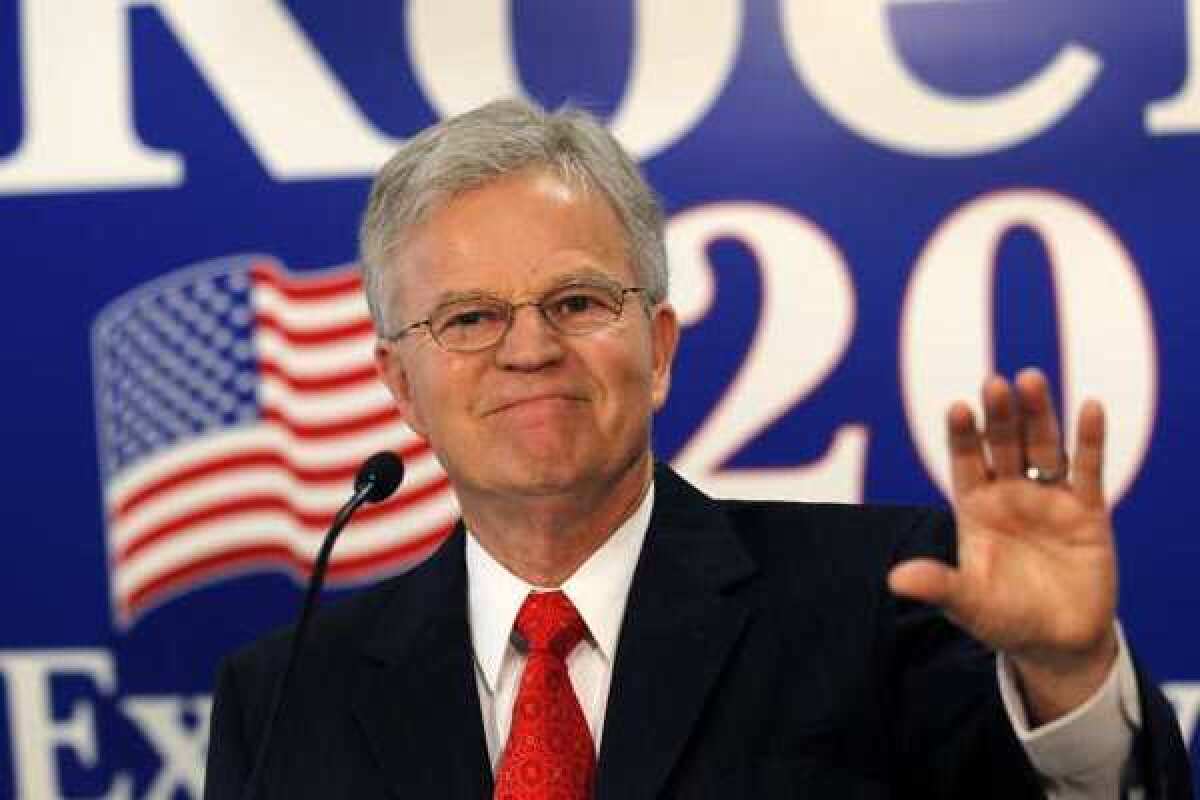McManus: Americans Elect meets reality

What happens if you start a political party and nobody comes? Six months ago, a newfangled third party burst onto the scene, full of hope and promise. It was called Americans Elect, and it sought to give voters a choice many said they were looking for: “centrist” candidates who could break the partisan gridlock paralyzing Washington.
In its founders’ heads danced visions of middle-of-the-road candidates who could transform American politics: Hillary Rodham Clinton, Colin Powell, Michael Bloomberg, Jon Huntsman Jr. Wealthy donors invested millions in a fancy website for an Internet primary, signed up 420,000 would-be “delegates” and got on the ballot in 29 states. Newspaper columnists, including me, pondered what effect it might have on the election.
Then the grand idea collided with reality.
COMMENTARY AND ANALYSIS: Presidential Election 2012
Americans Elect’s website is still humming, and its lawyers are still working to get the party on the ballot in all 50 states. But it’s missing two essentials: a viable candidate and enthusiastic voters.
In an embarrassing setback, not enough voters registered support for any of the fantasy candidates to meet the threshold for nomination. The top vote-getter was Republican candidate Ron Paul, but he says he isn’t interested in a third-party run. Among the few public figures who were willing to play, the top vote-getter was former Louisiana Gov. Buddy Roemer, a Democrat turned Republican; he won the online support of exactly 6,222 people, short of the 10,000 he needed.
It turns out you can’t get many voters excited about a party built by anonymous donors around an abstract concept. Centrist third parties have done respectably in American presidential elections when they were led by charismatic figures; Theodore Roosevelt won 27% of the vote in 1912, and H. Ross Perot won 19% in 1992. But without a charismatic leader, it’s hard to rally people around the banner of moderation.
Americans Elect isn’t gone yet, though. The organization appears likely to revise its rules, hold some kind of online ballot and make Roemer (or another equally obscure centrist) its nominee. Roemer scored 7% in a national poll this month, and that’s more than enough to tip the election in swing states such as Ohio and Florida (though Roemer says if he concludes he can’t win, he’ll drop out rather than be a spoiler, so it could be a short campaign).
Why couldn’t Americans Elect land a better-known candidate? It tried. Darry Sragow, a canny Democratic campaign strategist from Los Angeles, led a nationwide talent search to persuade top-tier names to jump in. Sragow says he talked with about 50 current and former officeholders, including incumbent senators and governors, but nobody was willing to take the chance.
“Everyone agreed that the system is broken,” Sragow said. “The problem is that their risk aversion was too high. There’s a fear of retribution if you break with your party.”
Retribution? Sure. Not like in Syria, where dissidents are shot, or Russia, where they’re merely jailed. But in Washington, a failed third-party presidential candidate could become a pariah — no Cabinet job, no ambassadorship, no consulting clients, no seats on corporate boards.
Sragow wouldn’t identify any of the individuals he talked with. But others in the effort said a bid to enlist Bloomberg failed because the New York mayor considered the race unwinnable and didn’t want to spend time on a quixotic gesture. Several corporate CEOs expressed interest but backed out once they realized the scrutiny they would undergo as presidential candidates.
So Americans Elect turned out to be a failure — this time. It had defects; its donors’ insistence on keeping their contributions secret made voters and potential candidates uneasy. But that doesn’t mean it was a bad idea. If Rick Santorum was winning the GOP nomination instead of Mitt Romney, a third party might look plenty viable.
And it still may have life left in it. The most useful role for a centrist third party in American politics would be in Senate and House races, where the two major parties have proved perfectly capable of nominating second-rate partisans. Voters in Indiana might welcome a second chance to vote for Sen. Richard Lugar, who lost the GOP primary in part because the “tea party” considered him too moderate. In 2010, Nevada voters yearned for a third choice beyond the uninspiring Sen. Harry Reid and the tea party’s mercurial Sharron Angle. In 2014, Americans Elect might be just the entity to facilitate such choices.
It’s not often remembered, but Toyota’s first model in the United States, the 1957 Toyopet Crown, was an underpowered failure. Apple’s first try at a tablet computer, the Newton, ended up on the scrap heap.
If Americans Elect can get on the ballot and stay there, it could still turn out to be a step toward rebuilding a vital center in Congress. Just not this year.
More to Read
Start your day right
Sign up for Essential California for news, features and recommendations from the L.A. Times and beyond in your inbox six days a week.
You may occasionally receive promotional content from the Los Angeles Times.







